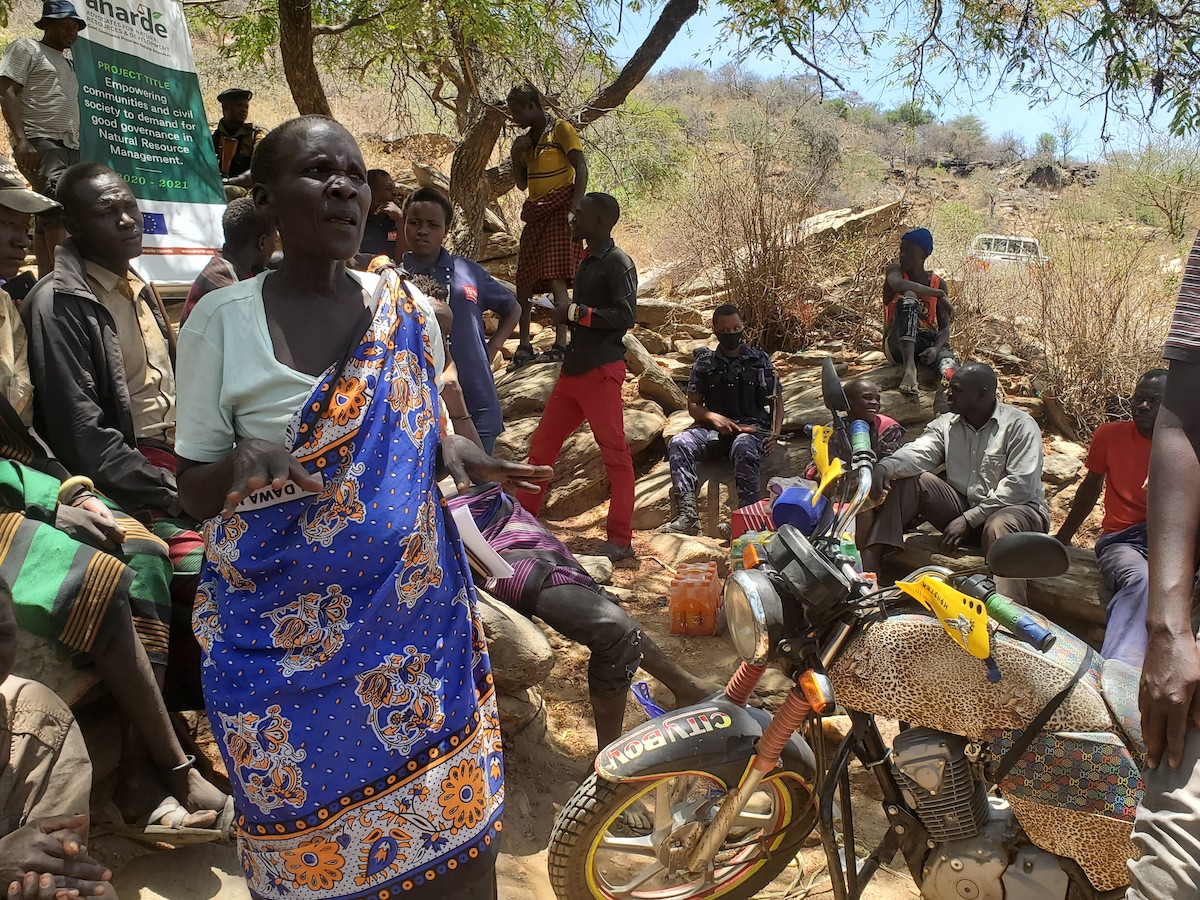Uganda’s extractives industry is growing exponentially and attracting both foreign and domestic mining companies. But too often, mineral-rich communities fail to benefit. Here, Kevin Bakulumpagi of ANARDE, Uganda discusses how Community Development Agreements can ensure affected communities both benefit from mining operations and are meaningfully engaged in agreements regulating mining activities.
Between 2021 and 2022, mining and quarrying activities in Uganda recorded a gross value added of 40,076 billion Uganda shillings – contributing 27.1% to its GDP. Whereas these country statistics seem attractive, the interests of mining-affected communities are often ignored, resulting in frequent community–investor tension and conflicts. Deeper and more meaningful engagement is needed to sustain the industry.
On 14th October 2022, the Ugandan government signed into law the Mining and Minerals Act 2022 to better regulate the industry and distribute benefits from mining activities. The act introduces the use of Community Development Agreements (CDAs) to enhance local community development and welfare while empowering communities to negotiate for more sustainable and beneficial arrangements.
Advocates for Natural Resources and Development (ANARDE), together with IIED and the Columbia Center on Sustainable Investment (CCSI) have advocated not only for the use but also the regulation of CDAs. We have supported the government with valuable inputs to ensure the interests of mining-affected communities are well represented.
Challenges with the current legal framework
Uganda’s legal framework on mining did not provide clear mechanisms for community engagement or finding consensus. Instead, mining companies already engaging with impacted communities – which are by no means all of them – do so on a case-by-case basis, privately working with local governments, community leaders or community trusts. In addition, most of the engagements are only voluntary or optional arrangements and are treated as Corporate Social Responsibility or certification requirements.
Most of these agreements are often non-binding or merely memoranda of understanding that are not legally binding. They are also often unplanned, lack transparency and vary from project to project with little means of enforcing agreed terms. Instead, engagements must be systematically institutionalised to ensure consistency, accountability and responsibility in company practice with corresponding repercussions for failure to fulfil their duties.
Why are Community Development Agreements important?
CDAs are legal arrangements made between investors and host communities and are viewed by government and other stakeholders as a mechanism to assist in the development and enhancement of community welfare through equitable revenue-sharing arrangements. Usually enforceable by all parties, CDAs provide a legal basis for communities to cement their arrangements with mineral rightsholders.
Mining companies are increasingly using CDAs to clearly define their relationships with and obligations to impacted communities. This helps to ensure that communities are not harmed by – and also benefit from – the value created by local large-scale investments.
CDAs also encourage the effective engagement with and participation of communities prior to any investment activities. CDAs facilitate access to information and encourage community-defined development outcomes, giving them an opportunity to shape the distribution of royalty payments, infrastructure development and other social benefits contributed by an investor.
By transferring some control from the government to impacted communities, CDAs empower communities to act – through legally enforceable agreements – should a company fail to deliver on its promises. The approach taken to CDAs will also have cross-sectoral significance for other large-scale land-based investments in fields such as agriculture and forestry.
Implementing CDAs in practice
With the law coming into force, CDAs have now become an integral part of the licensing process and a means to generate benefits for the community. For tangible results, however, significant efforts are needed to build capacity of all actors involved and to ensure that consultation and negotiation processes protect community rights. Much more work is needed if CDAs are to become more than mere legislative provisions:
-
New regulations must provide certainty and nuance about what is expected from all stakeholders, including companies, communities and the government, and
-
To ensure the provisions of the act are implemented effectively, it is crucial that institutional capacity and understanding is strengthened, that community capacity and awareness are enhanced, and that compliance and enforcement are closely monitored.
At ANARDE, we are supporting the Ugandan government in developing detailed regulations, drawing on our practical experience and engagement with communities in extractive-intense areas – such as Albertine Graben, Karamoja, Busia and Mubende – to develop proposed CDA regulations that complement provisions already in the Mining and Minerals Act 2022.
We further hope to assist the responsible institutions – such as the Ministry of Energy and Mineral Development and local governments – to anticipate potential challenges and close existing or potential gaps. By working in collaboration with the government, ANARDE also strives to amplify the voices of impacted communities and secure meaningful legal protections. But the law and supporting regulations are just the first steps. The processes used to reach substantive agreements are almost as important as the agreements themselves. There is a need to build further on what the law states to generate an organic approach for Uganda to regulating CDAs.
We cannot overstate the importance of community involvement throughout the process from negotiation to implementation and thereafter closure. ANARDE is currently developing a toolkit for communities to ensure robust processes are followed in practice. We are also working to raise awareness and provide training on step-by-step negotiation processes and the election of representatives, among others.
Achieving change
We believe that the benefits from natural resources must be enjoyed by communities most impacted by extraction. CDAs that have been ushered in by the Mining and Mineral Act 2022 are an important vehicle to achieve this. But achieving change will require significant effort from all stakeholders to ensure that the interests of all community members are taken into account, that agreements reached are seen as legitimate, and that there are clear channels for enforcement, so that dispute resolution is at the centre of the interaction, and that human rights, royalties and local development obligations are upheld to realise the benefits for the community.
Moving forward, government officials need to be made aware of and address the difficulties caused by top-down business-as-usual approaches. Civil society organisations need to improve their skills and provide support and backstopping for communities in negotiations. Communities need to engage with the process and demand accountability. And companies need to ensure not only the procedures but also the intention behind CDAs is achieved. Most important of all, the voices and unique circumstances of each community must be heard.
Photo Credit: A resident of Moroto District expresses her views on the relevance of Community Development Agreements Community in an outreach session by ANARDE in Karamoja region (Photo: ANARDE)
Relevant RLBI Navigator resources
IIED’s catalogue of community development laws related to the mining sector
This catalogue features legislative arrangements from 54 countries. The collection, which is fully downloadable and includes an interactive map, is intended to encourage and facilitate better research and policy.
The World Bank’s Action Note on Community development agreements
The note provides guidance for governments and companies on negotiating, designing, and implementing community development agreements with local communities in ways that benefit them.
This guide aims to help local organisations, communities and governments to carry out constructive, peaceful engagement and negotiation with companies and government. It provides information on the social aspects of oil, gas and mining projects, and on how to organize and represent community views and interests effectively within a constructive dialogue and negotiation process with government and companies.
Transparency International’s guide Improving transparency and accountability in the flow of benefits to mining communities
This report seeks to investigate and propose mechanisms that can be used to improve the flow of benefits to mining-affected communities. The report sets out what requirements should be met for a community trust (or similar legal vehicle) to offer protection of trust assets. It sets out recommendations on the manner in which the legal document should be crafted to protect communities, and proposes that the time is ripe for regulation and clarity. Although it is focused on South Africa, it will be relevant for countries facing similar challenges in the mining and other commercial sectors.
The International Council on Mining and Metals (ICCM)’s Community development toolkit
The ICMM has developed 20 tools to support mining and metals companies in promoting sustainable community development. These tools will also be useful to companies involved in other sectors. They offer practical guidance for every stage of the mining process from exploration, construction and operations, to decommissioning, closure and ultimately, the post-closure environment. These tools are accompanied by easy-to-use, step-by-step road maps.
The Legal Resource Centre’s Practical guide for mining-affected communities
This guide seeks to highlight the steps that concerned parties and communities can take to address the challenges that mining poses on communities. It gives communities the tools they need to understand the law that governs mining and to protect their rights. Although it focuses on South Africa, the tools proposed will be relevant for communities facing similar issues in other countries.
Related themes: Benefit-sharing; Consultation & FPIC; Community preparedness; Improving the law
About the Author
Kevin Bakulumpagi works for Advocates for Natural Resources and Development (ANARDE), a non-profit group of researchers, activists, organisers and lawyers with expertise in human rights advocacy, environmental governance, land rights, and corporate and government accountability.
About the Blog Series
This blog is part of the ‘Navigating the challenges of land-based investment’ series, which is jointly edited by Land Portal and IIED, with funding from FCDO, as part of the ALIGN project. Other blogs in the series can be found here.


